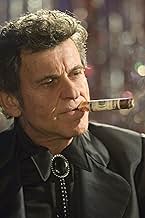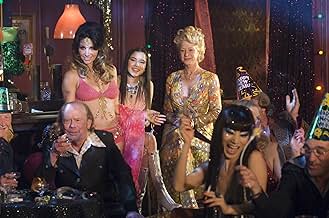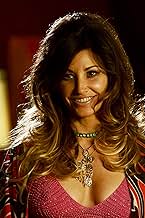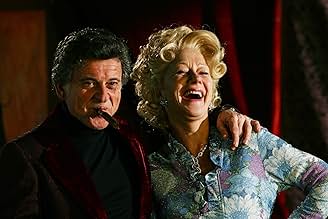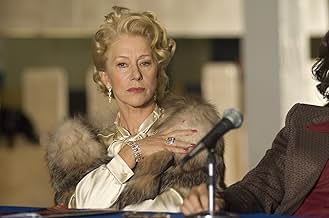IMDb RATING
5.6/10
3.4K
YOUR RATING
A drama revolving around a married couple who opened the first legal brothel in Nevada.A drama revolving around a married couple who opened the first legal brothel in Nevada.A drama revolving around a married couple who opened the first legal brothel in Nevada.
- Awards
- 1 win & 1 nomination
Raoul Max Trujillo
- Hernan Prado
- (as Raoul Trujillo)
- Director
- Writer
- All cast & crew
- Production, box office & more at IMDbPro
Storyline
Did you know
- TriviaThe second time that real-life husband and wife Taylor Hackford and Dame Helen Mirren have worked together on a movie. The first time was White Nights (1985).
- GoofsAt the beginning of the film, Charlie and the band are performing to a packed house. The drummer uses a crash cymbal from the very popular Zildjian company, the A Custom. This movie takes place in 1976, and the Zildjian A Custom didn't come out until 1990.
- Quotes
[first lines]
Grace Bontempo: Selling love will make you rich. That's what my mother taught me. Just don't put your heart in it.
- SoundtracksI Just Want to Make Love to You
Written by Willie Dixon
Performed by Foghat
Courtesy of Bearsville Records/Rhino Entertainment Company
By arrangement with Warner Music Group Film & TV Licensing and by arrangement with Victor Entertainment, Inc. for Japan
Featured review
Love Ranch fooled me but good. For some reason, I was picturing a raucous, raunchy comedy about a legal brothel run by Joe Pesci and Helen Mirren. But it's not really that way at all; no, this is a standard-issue melodrama about an abusive misogynist who runs his part of the world, his steely wife who runs the business side of the things, and the hapless pro boxer who gets mixed up with them. It's not funny because it's not supposed to be, and that's kind of sad; there's potential for laughs, but in the end all you get are clichés and bad character choices.
Charlie (Pesci) and Grace (Mirren) Bontempo open up the first legal brothel in Nevada. She's the daughter of a prostitute, he's done a stretch in San Quentin. It's the 1970s. They have a pretty good setup for themselves; good-looking women, steady clients, and the law on their side (and in their pockets). They don't want for much, seemingly. Then Charlie, a hotheaded tempest in a teacup if ever there was one, gets the idea that they'll garner more respect (or, more accurately, he will) if they own a successful professional boxer. So he buys the contract of one Armando Bruza, an up-and-coming Argentinian, much to Grace's chagrin. Charlie's banking on his guy doing well in his next fight, based on the rumor that Muhammed Ali would take on the winner.
Here, Pesci plays a slightly watered-down version of Tommy DeVito from Goodfellas. He's foul mouthed, ill tempered, not very bright about a great many things, and seems to survive on chutzpah and the good grace of, well, Grace. Naturally, being the proprietor of a brothel has its privileges, and Charlie samples the wares with some regularity, an occurrence that Grace idly tolerates. When she's asked to become Bruza's manager - as a felon, Charlie can't get a license - she's reluctant, but the swarthy boxer has other ideas. And so it goes.
Now, there's nothing inherently wrong with predictability. If I expect A to happen, and A happens, that's okay - as long as A wasn't spelled out as a fait accompli. If I expect A to happen, but B happens, that is also okay - as long as B is plausible. Here, I expect A to happen, and A happens, and it's obvious from almost the start of the movie that A will happen. This extends to character development as well. If a character does something, say, out of character (!), that's fine - as long as it propels the plot AND makes some bit of sense. Otherwise, it's just a ploy to get me to keep watching. In this movie, Charlie's character is so one-dimensional that when he makes an attempt to be lovey-dovey with Grace it's not even remotely believable. I can blame Pesci a little for this, but it just seem as if he had much to work with.
And for a movie that uses a brothel as its main background, there's very little naughty stuff going on; they may as well have set it in a video store, if those still existed. There's a side plot about some high-and-mighty moral compass waging a war against the legal brothel, but it's barely touched upon, pardon the pun. (The other puns are unpardonable.) The plot just bounces around from issue to issue, circling the main story threat of Bruza, Grace, and Charlie. The result is sometimes maudlin and hackneyed and other terms writers use to describe crappy writing.
Charlie (Pesci) and Grace (Mirren) Bontempo open up the first legal brothel in Nevada. She's the daughter of a prostitute, he's done a stretch in San Quentin. It's the 1970s. They have a pretty good setup for themselves; good-looking women, steady clients, and the law on their side (and in their pockets). They don't want for much, seemingly. Then Charlie, a hotheaded tempest in a teacup if ever there was one, gets the idea that they'll garner more respect (or, more accurately, he will) if they own a successful professional boxer. So he buys the contract of one Armando Bruza, an up-and-coming Argentinian, much to Grace's chagrin. Charlie's banking on his guy doing well in his next fight, based on the rumor that Muhammed Ali would take on the winner.
Here, Pesci plays a slightly watered-down version of Tommy DeVito from Goodfellas. He's foul mouthed, ill tempered, not very bright about a great many things, and seems to survive on chutzpah and the good grace of, well, Grace. Naturally, being the proprietor of a brothel has its privileges, and Charlie samples the wares with some regularity, an occurrence that Grace idly tolerates. When she's asked to become Bruza's manager - as a felon, Charlie can't get a license - she's reluctant, but the swarthy boxer has other ideas. And so it goes.
Now, there's nothing inherently wrong with predictability. If I expect A to happen, and A happens, that's okay - as long as A wasn't spelled out as a fait accompli. If I expect A to happen, but B happens, that is also okay - as long as B is plausible. Here, I expect A to happen, and A happens, and it's obvious from almost the start of the movie that A will happen. This extends to character development as well. If a character does something, say, out of character (!), that's fine - as long as it propels the plot AND makes some bit of sense. Otherwise, it's just a ploy to get me to keep watching. In this movie, Charlie's character is so one-dimensional that when he makes an attempt to be lovey-dovey with Grace it's not even remotely believable. I can blame Pesci a little for this, but it just seem as if he had much to work with.
And for a movie that uses a brothel as its main background, there's very little naughty stuff going on; they may as well have set it in a video store, if those still existed. There's a side plot about some high-and-mighty moral compass waging a war against the legal brothel, but it's barely touched upon, pardon the pun. (The other puns are unpardonable.) The plot just bounces around from issue to issue, circling the main story threat of Bruza, Grace, and Charlie. The result is sometimes maudlin and hackneyed and other terms writers use to describe crappy writing.
- dfranzen70
- Jun 25, 2011
- Permalink
Details
- Release date
- Countries of origin
- Official site
- Language
- Also known as
- Ljubezenski ranc
- Filming locations
- Production companies
- See more company credits at IMDbPro
Box office
- Budget
- $25,000,000 (estimated)
- Gross US & Canada
- $137,885
- Opening weekend US & Canada
- $44,220
- Jul 4, 2010
- Gross worldwide
- $146,149
- Runtime1 hour 57 minutes
- Color
- Sound mix
- Aspect ratio
- 1.85 : 1
Contribute to this page
Suggest an edit or add missing content





